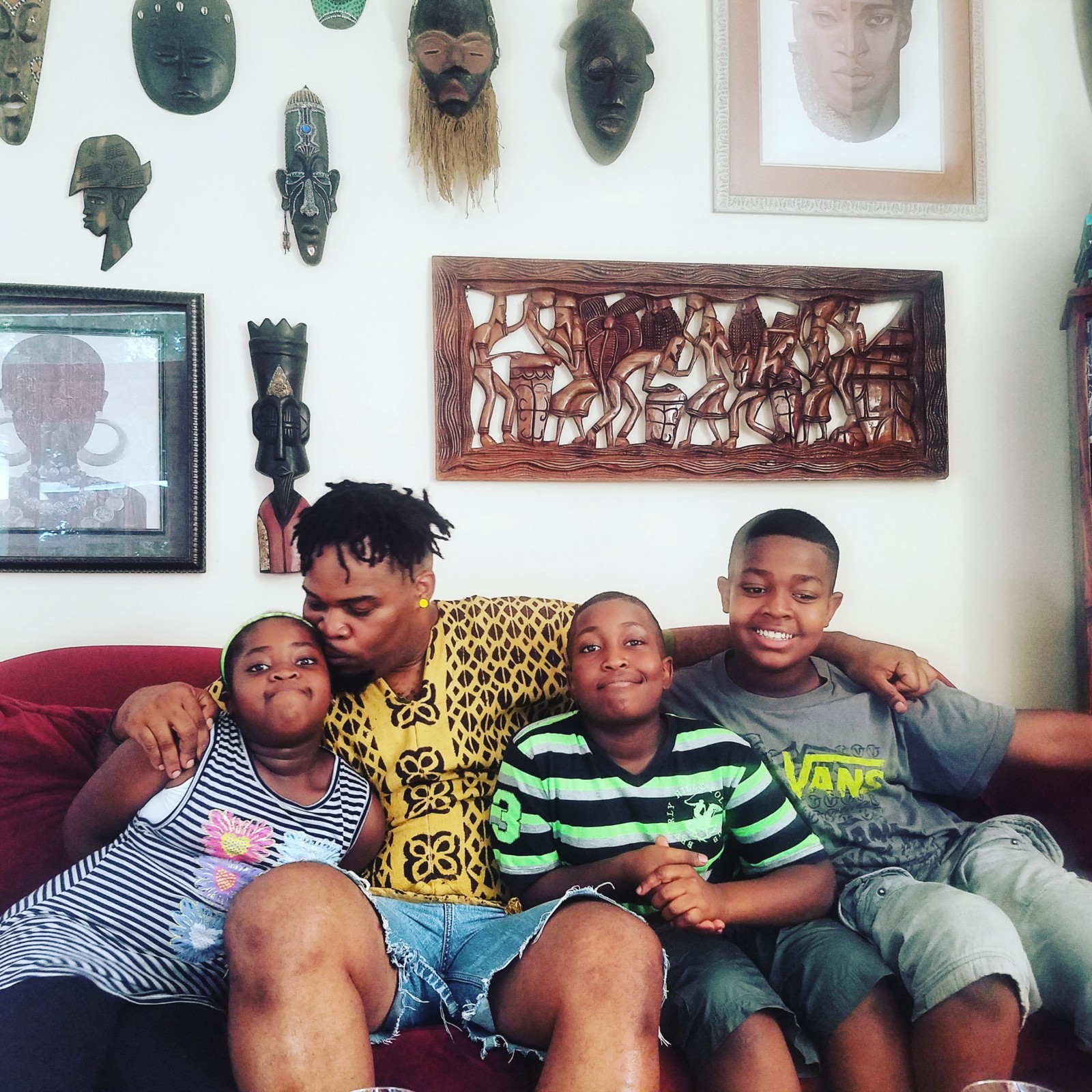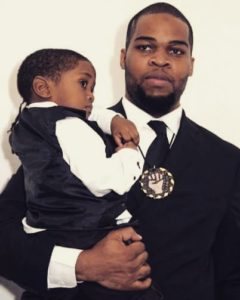
Gay. Jamaican. Muslim. Father.

The interviews I’ve done for All Our Families focus on how people create and conceptualize family. It’s an inspiring, moving, and beautiful process. While we center people’s experience of family in these stories, family is undeniably a container for the crucial aspects of our lives — our values, sense of purpose, and identity. Listening to Asad’s story reminded me deeply of these and other intersections. Since our interview, I’ve told him more than once that he needs — or rather, we need him — to write a memoir. Until then, I am honored to share a small piece of Asad’s story.
“I used to Google ‘gay, Jamaican, Muslim,’ and nothing would come up. I remember Googling it at work, and being like, ‘Yo, you’re not about to be the first one. I’m not about to be the first Jamaican, gay Muslim.’ I don’t have that in me. That’s not what I’m trying to do.”
Family and identity are deeply intertwined, whether we’re aware of it or not. When our identities line up outside the norms of our family and community, we have to navigate unpaved paths toward a sense of belonging. Sometimes we have to find or create new spaces to form community and family. That journey toward personal truth and wholeness is surely a necessary adventure, but it can be incredibly hard as well. Asadullah Muhammad’s journey is a powerful, painful story of what liberation sometimes costs and about how bravery and integrity can be compasses to steer one toward home.
Asad, as his friends call him, grew up in a Caribbean immigrant community in Jamaica, Queens. Like many first- generation children of immigrants, he was too American for his immigrant parents and too foreign for his American friends. But he also grew up with other kids who were similarly situated. “That, I think, humanized me a lot and made it a normal thing that all of our parents were from somewhere else, and we were all born in the same place. So, having friends from Trinidad, and Cuba, and Haiti…that was pretty much my norm.”
When he was two years old, Asad’s parents divorced. Though he was being raised by a single mother, his experience of family was abundant. His father lived close by and liked to throw big parties that brought together family and friends. A woman who lived across the hall and whom Asad called Grandma, took care of him before and after school while his mother was at work. Summers meant trips to family in Jamaica to. “It was like how many Black Americans send their children down south in the summer,” he says. “It gave me a great connection with the island.
To go from living on the eighth floor in the building where we grew up in Queens, to walking barefoot to the store, climbing mango trees, and jumping off rooftops…I felt like I was living in both spaces all the time. That was exciting for me and a rich experience.”
Asad knew early on that he was attracted to boys. “I would think of girls as pretty — I’d think, ‘I like her hair, I like how she put that outfit together, Rita’s looking good today. But I like it when I’m wrestling with Gene.’ I found myself befriending some of the cute boys in class — not doing anything with them, but just wanting to be close to them.” But those feelings weren’t welcomed, says Asad, “because I didn’t see anybody who was queer and totally showing up for themselves, I was like, ‘you’re weird, keep your feelings inside.’”

With no role models or clear path to take, Asad tried to explore his sexuality with the logic of a teenager going through puberty without having had the relevant sex talk. Eventually, he discovered the public restroom scenes of straight — and, often, married — men who hooked up anonymously.
As Asad matured, he did not see himself as gay, but as having an attraction that he needed to manage, restrain, and control. His need to repress his desire only intensified when he started college, where he began practicing Islam as part of a Black, Afrocentric community. “Beyond being spiritually uplifted by Islam, I felt like certain questions were being answered. I grew up Presbyterian, and Islam felt more holistic to me.” However, with the grounding of Islam came an emphasis on marriage and family. But he continued having one-night-stands with men while trying to pray away his attraction.
After college, Asad moved to Atlanta where he worked and developed community within the social justice and community service realm. A friend introduced him to Samina*. “I met her and it was like love at first sight. I was intimidated by her. She was beautiful, vegetarian like me, and we both had locs. It’s superficial, but we looked cute together. But it was also scary because it was like, ‘this could actually work.’”
Asad wanted to have the version of family his community lauded. “Islam gave me a lot of my values in terms of family. Marriage was half your religion, and children and babies were everywhere. That was seen as part of fulfilling God’s plan: You bringing more conscious Muslim babies into the world, that helps humanity.” As well, it was the life he’d always wanted. “When I was a kid watching the Cosby Show and Full House, I was like, ‘damn, they having fun.’ And I was just me and my toys, so, I wanted a big family. Samina was like God answering my prayers. I wanted to have a family but felt like it would never happen with a guy.”
Asad and Samina fell in love. ”I never got close to a girl in that way. It was a great feeling. She felt like a soulmate. We were so similar in so many ways, we laughed hard… She was my best friend.” Less than a year after they met, Asad and Samina married and soon had their first child. “I wasn’t having any relationships with guys sexually, although I thought about it, but I would fight it off. I was doing all these mind tricks to not have an attraction to men. I felt like it was working.[I thought,] ‘God’s answering my prayers. I feel less attracted to men, and I can control it,’ and I was doing all this surveillance of my body and judgment, and adjusting, all these mental games to prevent what’s naturally been my thing for 22 years.”
Every two years, they had another child until they had two sons and a daughter. Asad had the family he wanted and felt he was doing what he needed to follow the right path.
“It’s so twisted, but I felt almost like a superman in a way — and not in a good way. A straight man gets to just be a straight man, and can chill and do naturally what comes to him, but I had to monitor myself. I felt confident in the strength that I carried because I was holding so much. It wasn’t healthy, but I was handling it.”
By the time his oldest child was five, Asad and Samina had moved from Atlanta to New York from Atlanta — back to the city where he’d first discovered men’s bodies. He began visiting public restrooms again and hooking up with other men. He felt shame every time he did it, but rationalized his behavior. ”It was this thing of ‘you don’t even have to touch, or you may just touch, but not exchange bodily fluids, or you may exchange bodily fluids, but not kiss, but you don’t go all the way. You don’t have anal.’ It was always one more thing of figuring out how to have restraint and not be sexually frustrated.”
Simultaneously, Samina began to suspect that Asad was gay. She’d seen him looking at men, and he never wanted to have sex with her. The tension between them and within Asad was becoming unbearable. One evening while riding the subway, Asad was reading Soledad Brother: The Prison Letters of George Jackson and came across this line, “[G] enerations more will die or live poor butchered half-lives if you fail to act.” He explains, “I kept repeating it in my head and thinking about how, that’s how I feel: ‘You could be all about peace and movement building, but you’re going to continue living in fear, and you can never live up to your potential because you’re in the closet.’”
In that moment, Asad decided that he would tell Samina the truth. In his mind, coming out wasn’t about ending his marriage, but about telling his best friend the truth about who he was and not hiding anymore. He thought they might still be able to be a family.
Asad went home and came out to his wife. Samina, who had committed herself to raising their children as a stay-at-home-mom and was deeply devoted to both their family and the idea of their family, was devastated. Understandably, she felt anger, sadness, and betrayal and was untethered by the unraveling of her life. There was a tumultuous period of anger, therapy, mediation, and hostility as they ended their marriage.
Samina briefly remarried and had another son. It was during her pregnancy that their friendship reemerged, when he supported her in ways her new husband did not. Not only did she invite Asad to her baby’s naming ceremony with her friends and family, but she publicly thanked him for supporting her during her pregnancy. In some way, Asad felt like this public acknowledgement gave him back some of himself and allowed him to feel more grounded in his faith and family. “It took us almost seven years after our divorce to now be in a space where we are rebuilding trust. She respects me. I’m there for her and her son. I told her, ‘He’s not my birth son, but your new son is going to be a part of our family.’ I’m navigating what it is to support her now in that way.”
Asad and Samina’s family story is still evolving, and this chapter isn’t done being written. They are breaking new ground around what family can mean for them outside the narratives they’ve been given. It’s what so many of us are doing (or need to do) as we shed roles and structures that no longer serve us or fit our lives. In this process we can find more room to live fully and bravely and with love.
*Name has been changed to protect privacy.